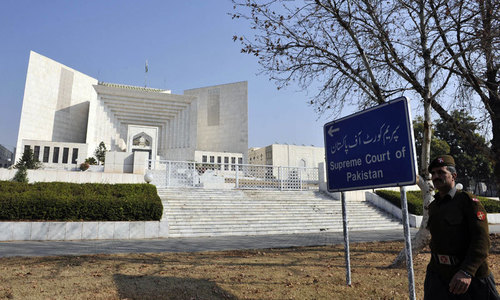WE’RE at that stage of the electoral cycle where calls for instituting a ‘presidential system of government’ gain voice. One difference this time around though is that these calls are partly coming from supporters and members of the sitting government. Usually its frustration with the performance of a disliked government that makes some quarters talk about large-scale change. This time the gap between government expectation and performance is being bridged by a sympathetic review of the harsh constraints placed on a helpless PM by parliamentary democracy.
Several commentators, most notably Fahd Husain on these pages, have already laid out the issue with such calls for presidentialism. But it remains worth stressing that for some people, the desire for a new form of government actually stems from a desire for greater discretionary power being given to the chief executive of the country, ie the prime minister (or president in their fantasies). This does not amount to a preference for presidentialism per se, it just shows a preference for authoritarianism.
As much as some may think otherwise, presidential forms of government have both a legal-constitutional basis, and a number of checks and balances on them. Legislative power — making laws — and money powers — passing expenditure plans and imposing taxes — remain with the legislature. This can lead to a whole range of dysfunctions where the chief executive may be blocked from their own preferences for laws and spending by an intransigent legislature (the case of the US screams loudly on this). There is no rule by whim or fiat.
Another argument given in favour is that it allows the induction of technocratic talent in executive positions, as is the case in the US. Experts can run ministries, rather than constituency politicians who lack domain knowledge. There may be some merit to it in theory, but our current Constitution has provisions for such an arrangement already, and, frankly, the track record of technocrats running ministries (where political decisions have to be made on a daily basis) is not stellar.
Any substantial change to how the country is governed is a call for changing the Constitution.
In fact, a significant stumbling block in improving government performance exists in the organisation and performance of the bureaucracy, which will stay the same under fantasy presidentialism. Nothing about parliamentary government stops anyone from radically altering bureaucratic structure through legal and executive reform to improve it.
There is, of course, a darker history to calls of enforcing presidentialism. They usually mask a distrust of devolution, a desire to accord greater power to the military establishment at the centre, and an undermining of rights of smaller provinces. And quite categorically, they have been associated with long periods of military rule. These are the historical conflicts that have shaped Pakistan’s current ruling arrangements; they have shaped how different political actors deal with one another; and most importantly, they have shaped the current Constitution.
Read: The truth about the all-powerful presidents in Pakistan
To put it simply, any substantial change to how the country is governed is a call for changing the Constitution. In its present form, the Constitution represents a resolution to historical political conflicts. Which ones in particular? The conflict between different ethnic groups for representation and rights in this country; second and relatedly, the conflict between different provinces on the distribution of resources; and third, the conflict between politicians and military leaders.
The current governing arrangement — parliamentary democracy in its post-18th Amendment form — is the answer that our politicians have produced to resolving these conflicts. It is not a comprehensive answer and leaves plenty of other questions — most notably the role of municipal governments — unaddressed; but high-scale, centrifugal conflict has been slowly and gradually diffused out of the system. The federation is as politically secure as it has ever been in this country’s history.
When thinking about changing the Constitution one needs to ask whether these conflicts are now less relevant than in the past: whether the issue of greater devolution to the provinces is no longer a pressing requirement; whether enough people feel their provincial/ethnic rights are secure enough to not require constitutional protection; and whether having a centralised form of government will still sustain sufficient space for civilian politicians and democracy.
If the current ruling party, or any other group proposing constitutional change, thinks that the country has moved past these conflicts, and that they are now only the cynical ploy of a corrupt political elite, then it should take its proposal to the public. If it thinks that centralised presidentialism will resolve issues of governmental performance, and that this is something the citizenry wants, then turn it into a transparent and clear political platform. Make it part of an election manifesto and advocate for it publicly.
This understanding of how political change should happen needs to be normalised and made mainstream. There is nothing intrinsically wrong with asking for a change in the Constitution. In fact, lots of things in the Constitution do require change, most notably, the lack of protection given to local governments (urban ones in particular). Taking ownership of such proposals and pushing for them to be debated publicly will only improve the capacity of the system to manage and resolve conflicts.
Read: The latest debate on the presidential system is as useless as the many ones before
Like any proposal, presidentialism will find supporters and detractors. Other political parties will likely oppose it and challenge the grounds on which it is being proposed. But that’s the nature of the political game under the rules that currently exist. The rules provide a pathway to those seeking change; it’s up to them to make it politically palatable enough to win.
The alternative is to do away with the game and its rules altogether by force and whim. This has been tried in the past on three occasions and rolled back each time. There is nothing in the present moment to suggest that a fourth time would work.
The writer teaches politics and sociology at Lums.
Twitter: @umairjav
Published in Dawn, January 24th, 2022














































